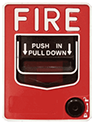Video MGMT System
 Access Control
Access Control
Voice & Data Wiring
 Burglar Alarm
Burglar Alarm
 Fire Alarm
Fire Alarm
Video MGMT System
Voice & Data Wiring
THOUGHT CENTER > Blog > Security Cameras
March 4, 2024
Mammoth Takeaways:
Businesses and organizations rely on high-resolution security cameras with clean lenses for effective monitoring. Keeping your cameras’ lenses clean is one of the best things you can do to maintain the effectiveness of your cameras.
After all, no matter how ultrahigh-resolution your cameras may be, if their lenses are beneath a layer of dust, you’ll get millions of pixels representing that dust—which isn’t typically helpful for site security applications.
Our team here at Mammoth Security knows from plenty of experience that a clean camera lens often makes the difference between reliable, high-quality surveillance and a service call.
Let’s walk you through the best practices for cleaning security camera lenses, including the tools you’ll need, the step-by-step process of cleaning cameras, and best practices.

With around 2,000 property crimes for every 100,000 people in the U.S. last year, according to the FBI, keeping your cameras functional is more important than ever.
Before we get to the step-by-step process for cleaning security cameras, keep the following best practices in mind for an optimized cleaning process for clear footage and camera durability.
Always be gentle when cleaning your security camera lens. Hard pressing or rough handling can scratch the lens and affect your camera's image quality.
Stick to cleaning solutions designed for camera lenses. Harsh chemicals can damage the lens coating and degrade image quality over time.
How often you should clean your camera lens depends on environmental factors like air quality and foot traffic.
First things first, before you start cleaning your camera lenses, you'll want to gather a few tools:
Safety first! Make sure to power down your camera before you start cleaning. This isn't just for your safety; it also protects the camera from any potential damage.
Use your soft brush or a can of compressed air to gently remove any dust or debris from the lens and camera body. If you're using compressed air, keep it a safe distance from the lens to avoid any damage.
For those stubborn spots or smudges, it's time to bring out the microfiber cloth. Apply a little lens cleaning solution to the cloth (never directly onto the lens) and wipe the lens in a circular motion very gently. This will help avoid streaking and ensure a thorough cleaning.
Once you've removed the spots, use a dry part of the microfiber cloth to buff the lens gently. This will remove any leftover solution and leave your lens sparkling.
Cleaning the lens of night vision cameras, including thermal and infrared models, is crucial for optimal performance in dark and low-light conditions.
Infrared cameras require clean lenses for effective light capture. Regular, careful cleaning enhances nighttime image clarity and ensures reliable surveillance even in total darkness.
In addition to the obvious advantages of unobstructed security footage for situational awareness and evidence documentation, keeping camera lenses clean can extend the life of your camera by preventing lens damage, corrosion, and overheating, as well as general wear and tear. Here’s how:
Dirt, dust, and other particles can scratch the lens surface over time if not removed. Scratches can degrade image quality and eventually necessitate lens replacement or repair.
Accumulated debris can interfere with the camera's ability to focus and capture clear images.
This could force the camera to work harder, shortening its lifespan due to increased wear and tear on its components.
For cameras with sensors and electronics closely integrated with the lens (like bullet, PTZ, and thermal cameras), dirt and grime insulate and contribute to overheating.
In harsh environments, especially outdoors, moisture, salt, or other corrosive substances can adhere to the lens surface.
Regular cleaning helps prevent corrosion that can damage the lens and camera body.
There you have it—a straightforward guide to keeping your security camera lenses clean and your video feeds crystal clear.
At Mammoth Security, we're all about making sure you're equipped with the knowledge and tools to keep your space safe and secure. If you've got any more questions or need assistance with your security system, we're here to help. Just give us a call! If you’d like a free site assessment and consultation, click to contact us and fill out the form.
Happy cleaning—and here's to clear views and secure premises!
NOT COMPLETELY SURE?
860-748-4292To clean a security camera lens effectively, you’ll need a few key tools: a soft, clean brush or a lens brush, a can of compressed air, a microfiber cloth, and a lens cleaning solution specifically designed for camera lenses.
You should clean security camera lenses depending on their environment: outdoor cameras exposed to elements like dust and debris might need monthly cleaning, whereas most indoor cameras in controlled environments, such as office waiting rooms, should be cleaned once every three to six months. For indoor areas where smoking is permitted, cameras may require cleaning as often as every two weeks due to the accumulation of smoke residue.
Yes, cleaning your security camera lens can extend the life of your camera by preventing lens damage, reducing wear and tear, minimizing the risk of overheating, and preventing corrosion.
Cleaning the lens of a night vision camera, including thermal and infrared models, is crucial for optimal performance. Use a soft brush to remove debris gently and a microfiber cloth with lens cleaner for smudges. Ensure the lens is clean for effective light capture and enhanced night-time image clarity in low-light and zero-light settings.
It's important to avoid harsh chemicals when cleaning security camera lenses because they can damage the lens coating and degrade image quality over time. To ensure safe and effective cleaning, stick to cleaning solutions specifically designed for camera lenses.
Regular cleaning of security camera lenses enables unobstructed, high-quality surveillance footage, which is crucial for situational awareness and evidence documentation. It prevents lens damage, corrosion, and overheating, which can degrade image quality and camera functionality.
Indoor cameras in areas where smoking is allowed require more frequent cleaning, as often as every two weeks, due to the rapid buildup of smoke residue and particles. This accumulation can quickly affect lens clarity and camera performance.
Cleaning security camera lenses can prevent overheating by removing dirt and grime that insulate and trap heat in cameras with sensors and electronics closely integrated with the lens, such as bullet, PTZ, and thermal cameras. Regular cleaning ensures proper heat dissipation and maintains camera functionality.